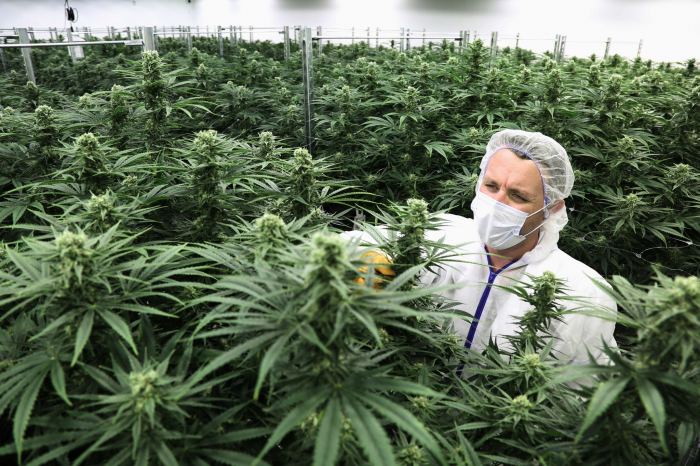The nationwide market for cannabis opened on Wednesday at midnight amid lingering questions about the impact on health, the law and public safety.
Information has been sent to 15m households about the new laws and public awareness campaigns.
But there remain concerns, including about the readiness for police forces to tackle drug impaired driving.
Uruguay was the first country to legalise recreational marijuana, although Portugal and the Netherlands have decriminalised the drug.
Canadian provinces and municipalities have been preparing for months for the end of cannabis prohibition.
Provinces and territories are responsible for setting out many of the details for where cannabis can be bought and consumed within their jurisdictions.
This has created a patchwork of legislation across the country as jurisdictions choose more or less restrictive frameworks for selling and using cannabis.
Shops in the province of Newfoundland, the most easterly time zone in Canada, opened as midnight struck for the first legal sales of cannabis in the country.
There remain unanswered questions on some key issues around how legal cannabis will work in Canada.
A number of analysts are predicting a shortage of recreational marijuana in the first year of legalisation as production and licensing continues to ramp up to meet demand.
And the marketplace itself is still in its infancy.
Ontario, Canada's most populous province, will only begin opening retail stores next spring, though residents will be able to order cannabis online.
British Columbia, one of the provinces with the highest rates of cannabis use, will only have one legal store open on Wednesday.
Until retail locations are more widely available, some unlicensed cannabis retailers, which have flourished in the years since the law was first proposed, may stay open.
It is unclear if police will crack down on them immediately, or if they will turn a blind eye.
Legalisation fulfils a 2015 campaign promise by Prime Minister Justin Trudeau, the leader of the governing Liberal Party.
The prime minister has argued that Canada's nearly century-old laws criminalising use of the drug have been ineffective, given that Canadians are still among the world's heaviest users.
He said the new law is designed to keep drugs out of the hands of minors and profits out of the hands of criminals.
The federal government also predicts it will raise $400m a year in tax revenues on the sale of cannabis.
Cannabis possession first became a crime in Canada in 1923 but medical use has been legal since 2001.
Canada follows in the footsteps of Uruguay, which became the first country in the world to legalise the sale of cannabis for recreational use in 2013. A number of US states have also voted to end prohibition.
Medical marijuana is also gaining ground in many European countries.
Adults will be able buy cannabis oil, seeds and plants and dried cannabis from licensed producers and retailers and to possess up to 30 grams (one ounce) of dried cannabis in public, or its equivalent.
Edibles, or cannabis-infused foods, will not be immediately available for purchase but will be within a year of the bill coming into force. The delay is meant to give the government time to set out regulations specific to those products.
It will be illegal to possess more than 30 grams in public, grow more than four plants per household and to buy from an unlicensed dealer.
Penalties for some infraction will be severe. Someone caught selling the drug to a minor could be jailed for up to 14 years.
Some critics say the penalties are too harsh and not proportional to similar laws like those around selling alcohol to minors.
















































